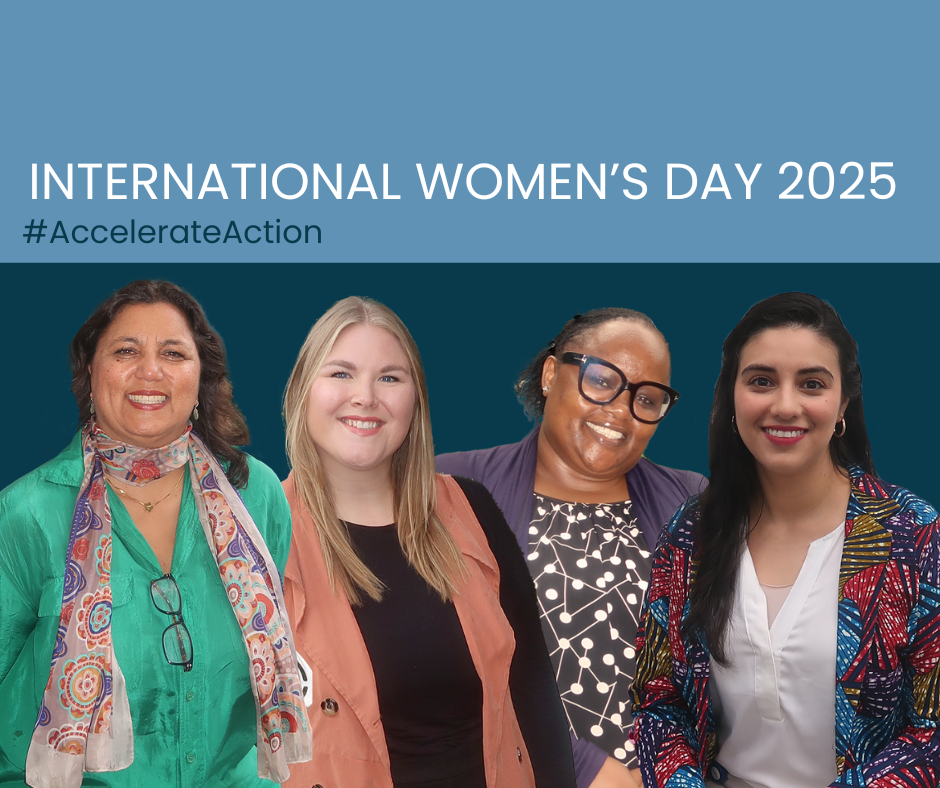This International Women’s Day (IWD), Rice360 is proud to advocate for the inclusion of women’s voices, ideas, and leadership in workplaces and communities across the globe. Four remarkable leaders in global health share their stories about what inspires and empowers them as women in the field.
International Women’s Day is an annual holiday bringing attention to key women’s issues like women’s rights, gender equality, reproductive rights, and violence and abuse against women. Rice360 joins women around the world by celebrating women and girls everywhere. We recognize the importance of spotlighting global health leaders who drive change, innovation, and transformation toward a better world.
__
Sonia Sosa Saenz
Associate Director, Global Health Fellows Program
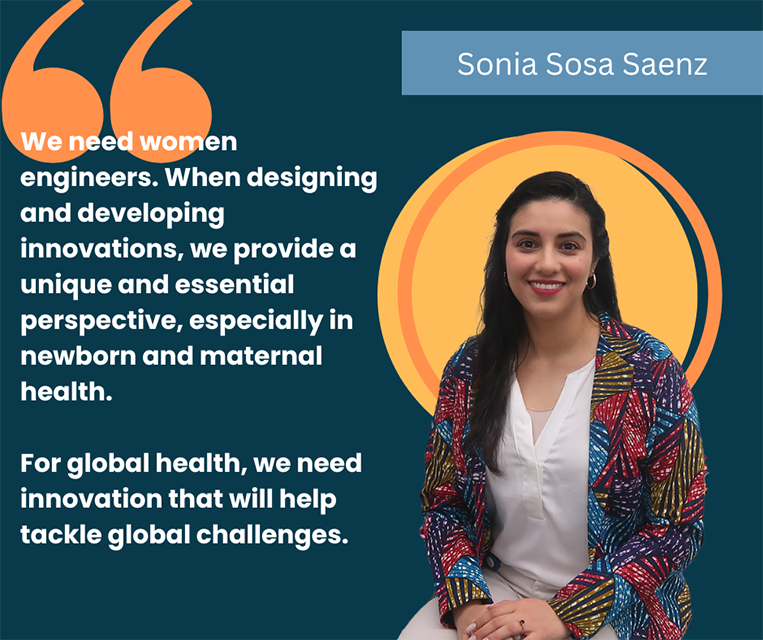
Sonia graduated with a Bachelor of Biomedical Engineering from LeTourneau University and has 9+ years of experience with biomedical technology development and clinical research. Sonia started her career as a Rice360 Global Health Fellow and is currently the associate director of the global health fellows’ program at Rice360.
Interviewer: How has your childhood influenced your career?
Sonia: I was born and raised in Tampico, Mexico. Growing up, I was involved in a variety of sports. So, when I went to college and started my degree in biomedical engineering, I jumped at the chance to join any project related to sports biomechanics, which links sports and engineering together (my two passions). What led me to global health was actually a research project in undergrad that focused on improving the design of wheelchairs designed specifically for low-resource settings. While traditional hospital wheelchairs may be available, those needing a wheelchair for their daily activities need special wheelchairs. Patients with cerebral palsy often need extra support with their head to ensure their spine stays straight; that customization must come from a wheelchair that can adapt. When putting these features together, they become expensive and hard to make across the world. This is what my project aimed to address, what sparked my passion for developing affordable medical technologies, and what ultimately led me to the Rice360 Global Health Fellowship.
Interviewer: What experiences have defined your career?
Sonia: First, my faith is very important. It drives everything I do because I feel like I receive so much love from God, and the only thing I can do is give back to others. Second, I believe healthcare is a right, not a service. It’s a fundamental human right, and we should all do our best to make it accessible to everyone. Third, I had a lot of great multicultural experiences that not a lot of people have gotten to do. It has helped me to be open to other cultures or people who might be different from me. I try to lead with humility and openness. It has affected my personal life and how I communicate with others in my career and beyond.
Interviewer: What motivates you and your career in biomedical engineering?
Sonia: The most rewarding part of my career is spending time with our colleagues abroad. The hospital staff, especially, are the real heroes of the story. Day in and day out, they try to serve their community to the best of their abilities, with the best they have. Being able to work alongside them and champion them while ensuring they have everything, they need to do their work is incredibly motivating.
I highly encourage people to consider biomedical engineering as a profession because we are so needed. You may not be treating a patient directly, but you will be helping solve the problems that affect many. We need women engineers. When designing and developing innovations, we provide a unique and essential perspective, especially in newborn and maternal health. For global health, we need innovation that will help tackle global challenges.
__
Natasha Rhoda
Neonatal Expert, NEST360 Technical Advisory Team
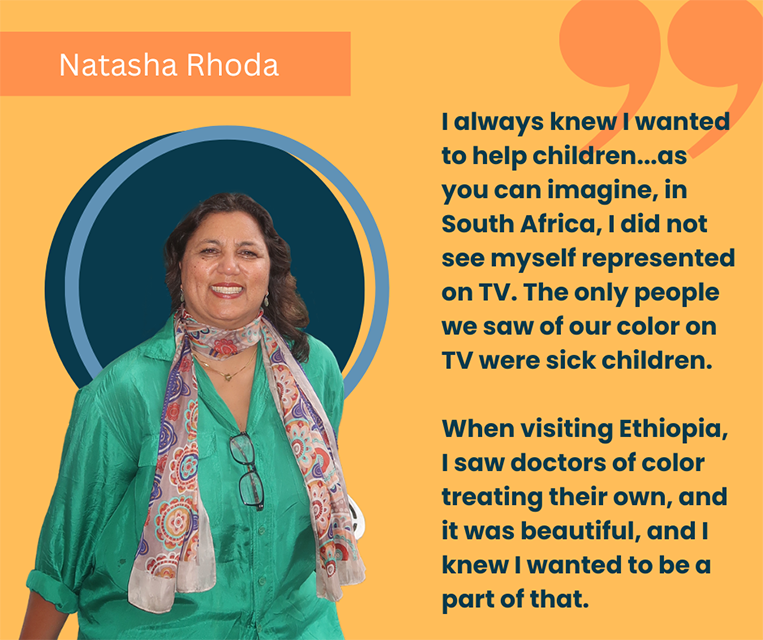
A neonatologist and head of the clinical unit at Mowbray Maternity Hospital, Dr. Rhoda obtained her PhD and medical degree from the University of Cape Town. She currently serves as the neonatal expert on the NEST360 technical advisory team.
Interviewer: What led you to become a doctor and care for babies?
Natasha: I should start at the end. I am qualified as a neonatologist—a pediatrician specializing in newborn babies. I’ve known since I was three years old that I wanted to be a doctor. My mom said I woke up one day and said to her, “I want to be a doctor!” I have been fortunate that my path towards medicine was supported and nurtured.
I always knew I wanted to help children, and I had such an eye-opening moment when visiting Ethiopia. As you can imagine, in South Africa, I did not see myself represented on TV. The only people we saw of our color on TV were sick children. When visiting Ethiopia, I saw doctors of color treating their own, and it was beautiful, and I knew I wanted to be a part of that. I have this compass within me that has a strong direction. This role that I currently occupy with NEST360 is what I had only dreamed of. Every day, I get to help deliver life-saving care to newborns across Africa and drive change. I am so blessed I have been asked to do this job. It feels like home; it feels right.
Interviewer: What personal experiences led you to who you are today?
Natasha: My father passed away about 10 years ago, and my mom is 80 years old now. We were always told not to puff our chests. You don’t need to be a peacock; just do what you must do. My dad always taught me that everyone has a specific function or skill that they bring to the table, and just because you are a doctor does not mean you can elevate yourself. He would also say, “If you see a waiter, you can’t do the waiter’s job, and neither can he do your job. So, you need to respect what he does. And in return, hopefully, he will respect what you do.”
We have been taught to respect people for who they are and what they do from a young age. I truly believe that’s what makes this job such a good fit for me. Because I don’t see a hierarchy, I just see people helping each other, collectively trying to save newborn lives.
Interviewer: Who inspires you?
Natasha: There are two categories of people in my domain. There are those in the academic sphere that I admire. People like Prof. Elizabeth Molyneux, who is 80 years old, do so much. She stays so humble. I admire her from an academic point of view. Other people I admire are people like my mother. She is not a doctor or accomplished from an educational standpoint, but she is such a strong woman. She has taught us good values that I now implement as a mother. There are lots of those women in our community. They might not have the education or the money, but they are strong women and good mothers. I’ve got a few of those in my family.
__
Michelle Nodskov
Associate Director of Education Programs
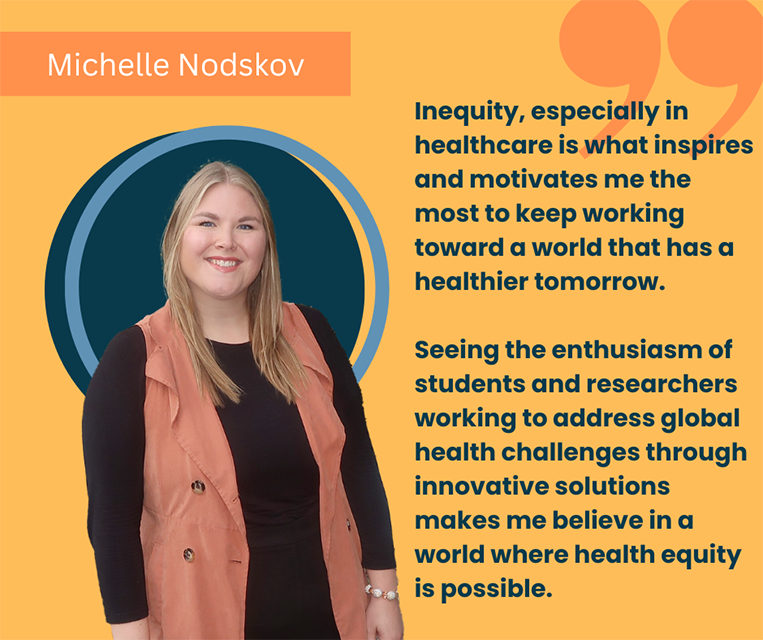
Michelle attended undergrad at the University of Nebraska and received her MBA from the University of Houston in 2020. She has been working in higher education for 12 years and currently serves as the Assistant Director of Education Programs at Rice360.
Interviewer: What experiences have helped define you and your approach to your career?
Michelle: Without a doubt, my experiences within Global Health shaped my career approach. I have had the opportunity to travel globally, where I have seen inequity, especially in healthcare. This is what inspires and motivates me the most to keep working toward a world that has a healthier tomorrow. Seeing the enthusiasm of students and researchers working to address global health challenges through innovative solutions makes me believe in a world where health equity is possible. I also believe in the power of kindness – leading with empathy can drive real, meaningful change.
Interviewer: Please share what it is like working in higher education and helping students.
Michelle: Each new student cohort brings a new set of needs, and it’s my job to identify and adapt to them to provide the best support possible. The challenge – and the reward – is learning to evolve with each group. When the cohort changes, I start from the beginning again, learning about each student to understand the best way to support them. Every semester is a new opportunity to pivot my strategy for student support. I thrive when I am testing the limits, trying new approaches, and seeing the positive impact our department has on students.
Interviewer: What is your advice to students and others in higher education?
Michelle: A saying that has been rattling around in my mind recently is: “We don’t rise to the level of our expectations; we fall to the level of our training.” For years, I have told pre-med students at the start of their academic journey, “Don’t buy your white coat yet – you have a long way to go, and you have to put in the work.” It is easy to set ambitious goals, but without proper training, preparation, and a strong support system, those aspirations won’t materialize. Students should focus on building a strong foundation, and the rest will come.
__
Edith Gicheha
Clinical Training Director, NEST360
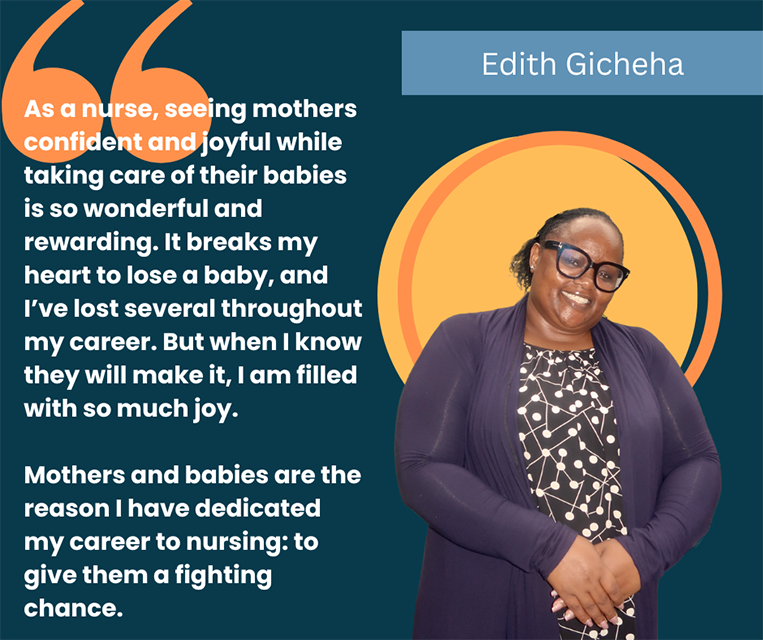
Edith is an experienced neonatal nurse and educator with over 20 years’ experience in caring for mothers, newborns and the staff who care for mothers and babies. In her career, she has trained and mentored numerous staff including 150 neonatal nurses in Kenya. Edith is passionate, practical and a real newborn care champion and advocate. She currently serves as the Clinical Training Director and Education co-Lead for NEST360.
Interviewer: Why did you first become a neonatal nurse, and what keeps you motivated to continue your work?
Edith: During my internship hospital rotations, I was most fulfilled in the labor unit. Everything just clicked when I was in there! As a nurse midwife, seeing mothers confident and joyful while taking care of their babies is so wonderful and rewarding. It breaks my heart to lose a baby, and I have lost several throughout my career. At the core of who I am, I do not like to see people suffer
so when I know I can do something to help them make it, I am filled with joy and this drives me to do whatever I can for them. The mothers and babies are the reason I have dedicated my career to nursing: to give them a fighting chance.
Throughout my career, I discovered that while I like to midwife babies, I also like to midwife the passion people have for providing high-quality care for babies. I go home feeling good, knowing that I can support and mentor both healthcare providers and mothers to effectively care for their babies.
Interviewer: What is your impact in newborn care?
Edith: I am not sure if I alone have made a huge impact because I see that there is still so much more to be done. What I know for sure is I am so honored to be part of the NEST360 team because I feel this program gives Africa a huge opportunity to positively transform how we do newborn care. I recognize that I do not have all the solutions, but with a great team like NEST360 I know we can
help each other bring out the best and do better. Only together will we be able to move the needle towards true impact and we are beginning to see it happen.
Interviewer: What would you want to see changed in the next few years?
Edith: My goals have changed since being with NEST360. Previously, I was just focused on Kenya and what needs improving. But now my goals have changed because I see Africa. I feel it. We have to light the whole of Africa. We have to. We need to.
Newborns across Africa should have the same chance to survive no matter where they are born. All families should have a hospital they can go to that has the resources needed to help babies not only survive but thrive. One of the biggest challenges we have in Africa is shortage of staff and especially nurses with neonatal care skills at bedside level and with higher education. This is a challenge that concerns me a lot and I am willing to take this on with like-minded people and organizations. We need to ensure we have enough staff at the bedside and in the health system who not only have head knowledge, but are also skilled and passionate about the service they are providing.
We need to encourage people in Africa to take action. I am a firm believer in trying new things and not being afraid. We don’t have to be perfect, but we have to start.

